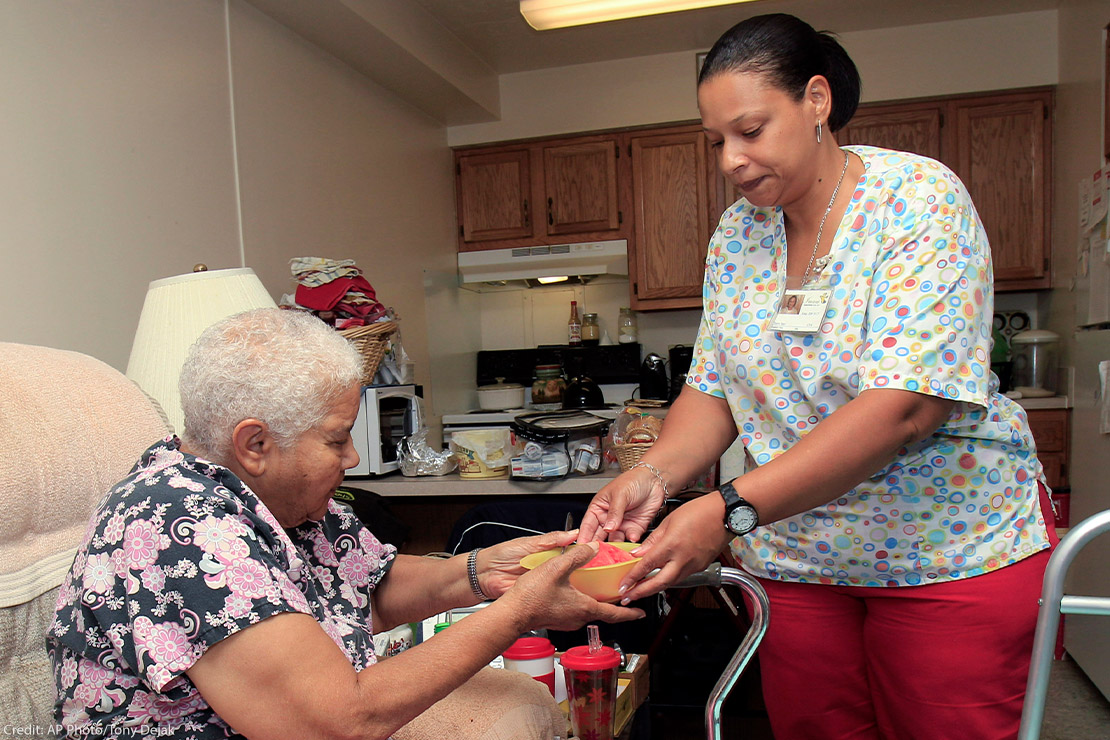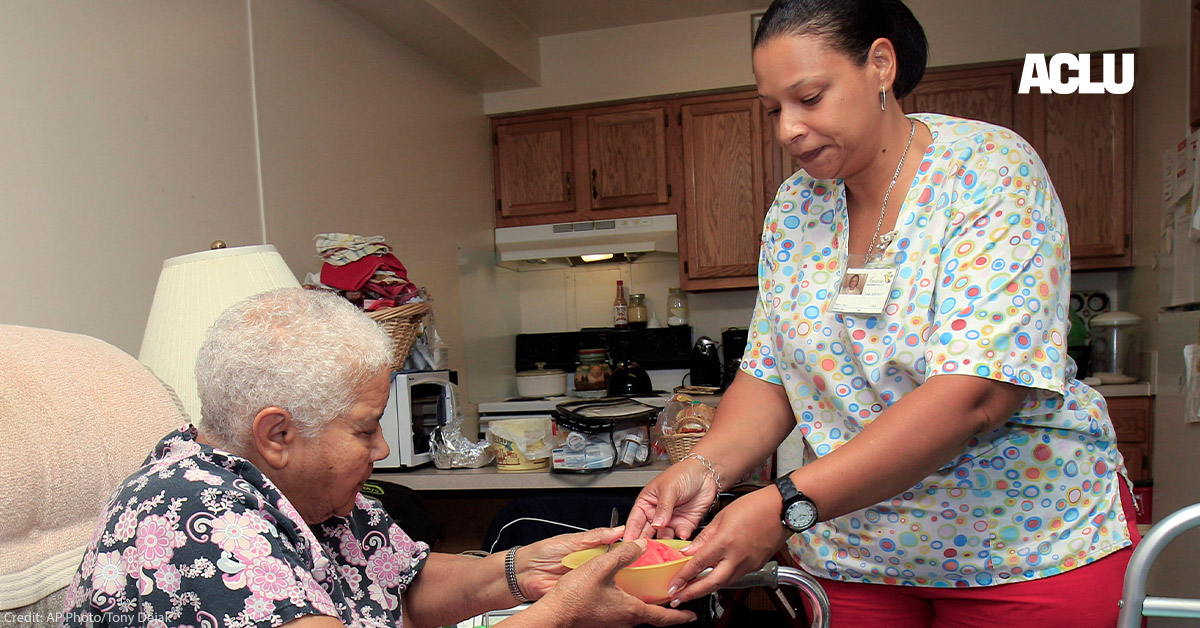Ashley Johnson, Legal Fellow, ACLU Women's Rights Project
At the onset of the pandemic, as most of the country shuttered themselves inside to avoid COVID-19 infection, home health aides remained on the front lines, taking care of our loved ones and risking their lives in the process. These caregivers — the majority of whom are Black and Brown immigrant women — face considerable risks on the job.
Home care workers help people with disabilities and seniors with intimate and vital tasks like bathing, dressing, and eating, making social distancing impossible. Yet, many states’ emergency COVID-19 measures excluded home health aides from their definition of “essential workers,” failing to assure them access to adequate PPE, prompt COVID-19 testing, and vaccines.
And home health aides, like many essential workers, are prone to pandemic-related emotional burnout because they often work alone, isolated from supportive colleagues. Now in the pandemic’s third year, we must urge both federal and state action to ensure that those who care for our loved ones and neighbors are able to stay healthy and safe.
In a survey of home health aides’ experiences during the pandemic, 76% of personal care attendants and 64% of agency-employed home health aides said they could not afford to stay home if they or a family member got sick.
More than 8.6 million older adults and people with disabilities rely on home health aides, and home care remains one of the nation’s fastest growing sectors. But home health aides are among the lowest paid workers, with a median wage of $13.02 per hour, or $27,080 annually for a full time aide. Unsurprisingly, in a survey of home health aides’ experiences during the pandemic, 76 percent of personal care attendants and 64 percent of agency-employed home health aides said they could not afford to stay home if they or a family member got sick, or quarantine if they were exposed to COVID-19. It’s no wonder why 1 in 6 of these workers lives below the federal poverty line.
The safety and dignity of home health aides is inextricably linked with the safety and dignity of those they care for. Assuring higher pay and safer conditions for home health care workers is essential to attracting and retaining high quality caregivers. Government-mandated pay increases can, however, have the unintended consequence of hurting the very communities served by home health aides, because state and federal Medicaid reimbursements are inadequate to cover these higher costs. As a result, an increase in caregivers’ pay can often lead to a decrease in caregivers’ hours — and thus, a decrease in needed support for people with disabilities.
We can and must avoid pitting these communities against one another. Instead, we must consistently couple our advocacy on behalf of home health aides with calls for increased Medicaid funding to ensure in-home care remains affordable.
The physically-strenuous intimate care home care workers provide result in on-the-job injuries at often higher rates than in other industries.
The Build Back Better legislation introduced in Congress last year would have invested $150 billion into the home care workforce and in home and community-based services for people with disabilities. Though far less than the $400 billion originally proposed by President Biden, this funding would have presented a transformative, vital investment in home health aides’ dignity and their clients’ well-being. Now, as the White House and Congress negotiate new legislation, it is crucial that any new budget package expands access to home-based care. The bill should incentivize states to improve coverage under Medicaid, the primary source of funding for such services, and increase funding to allow states to expand home-based services.
If federal legislation is enacted, it will only be a long-overdue first step, and it must not be the last. States can and should take action. Some already are:
- In March 2021, the New Jersey legislature passed a budget that included a home and community-based service worker rate-setting provision, increasing wages.
- In September 2021, Colorado passed a measure that will increase pay for home care workers using federal pandemic relief money.
- In Maine, the governor recently announced that $126 million in MaineCare funds will be allocated as bonuses for home care and community-based workers.
- In New York, the state budget raised home care workers’ pay $3 an hour, but the Fair Pay for Home Care Act would establish even greater protections: a base pay for home health aides of at least 150 percent of the regional minimum wage.
In addition to the immediate dangers of COVID-19, home health aides’ safety and health concerns are distinct and dire.
The physically-strenuous intimate care these workers provide results in on-the-job injuries at often higher rates than in other industries. Nearly half of home health aides have reported being physically and sexually harassed on the job, and they also must contend with the family members of those they care for. And despite reporting higher rates of violence than people in more traditional work settings, home health aides are less able to vindicate their legal rights when violations occur because they are disproportionately non-unionized.
Workplace laws themselves must be reformed to protect this especially vulnerable group. Federal anti-discrimination laws, for instance, apply only to employers with 15 or more employees, while the Fair Labor Standards Act — which provides minimum wage and overtime protections — has loopholes that exclude some home health aides outright, or are open to misinterpretation and abuse. Rep. Pramila Jayapal, along with Sens. Kirsten Gillibrand and Ben Ray Lujan, sought to correct this injustice by reintroducing the National Domestic Workers Bill of Rights Act in July 2021, which would expand paid sick leave and anti-discrimination protections to home health aides. But the legislation has not progressed in this Congress.
It has never been more crucial to invest in the people who care for us and our loved ones. By increasing wages and pushing states to make home care services affordable, Congress would take a significant step forward in improving home health aides’ financial stability while attracting new workers, remedying a critical shortage in this sector. But we must take even more dramatic action to shore up our caregiving infrastructure — during the pandemic and beyond.
https://www.aclu.org/news/civil-liberties/home-care-workers-protect-the-civil-liberties-of-people-with-disabilities-they-need-protection-too
The safety and dignity of home health aides is inextricably linked with the safety and dignity of those they care for.



